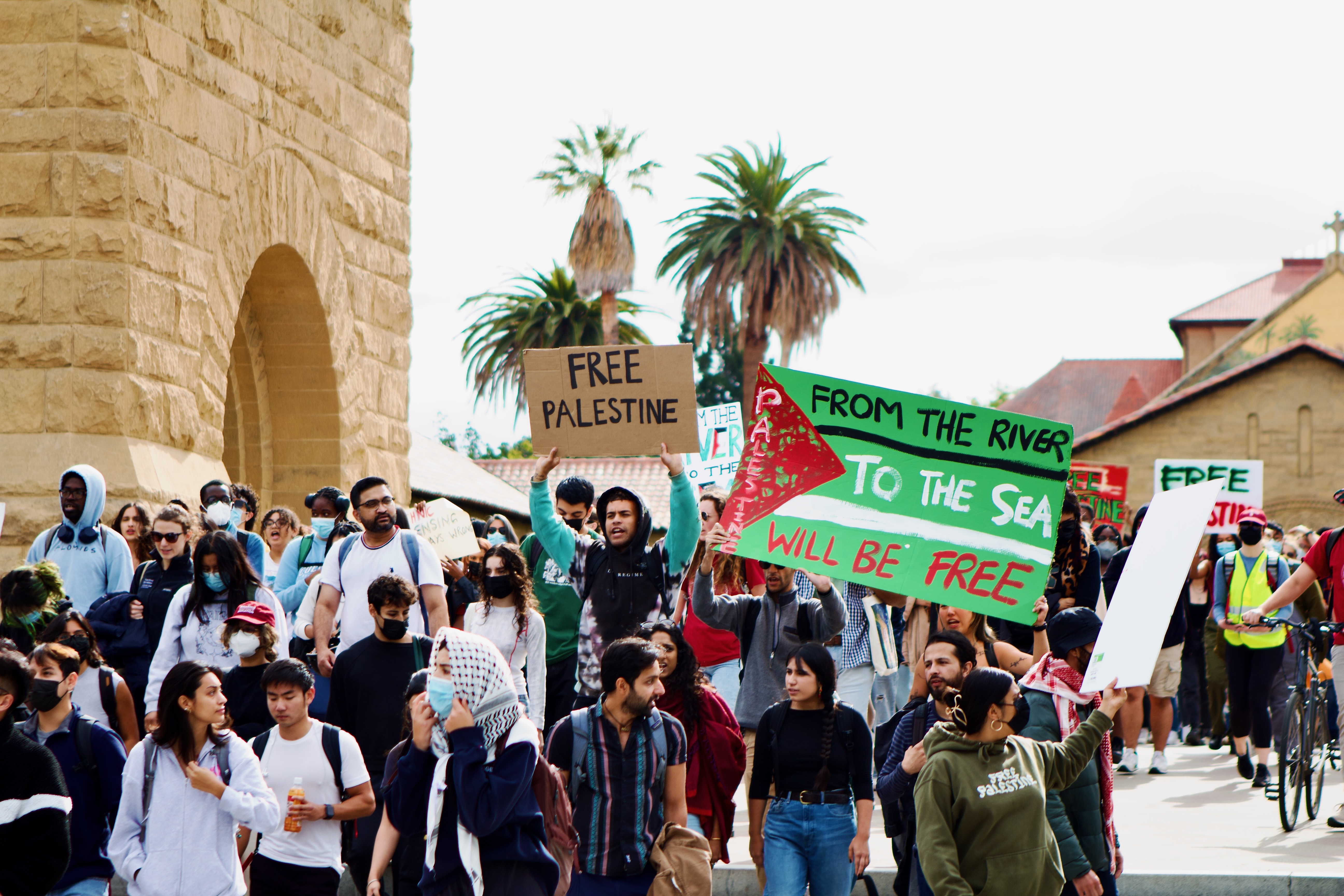On April 24, President Richard Saller and Provost Jenny Martinez sent a message to students reminding them of Stanford’s rules regarding overnight camping and noting that those who violated this and other rules would be given OCS citations, disciplined and possibly arrested. We believe such bureaucratic responses do not sufficiently recognize the reasons the students are protesting in the first place.
The Saller and Martinez notice gestured in the vaguest manner possible at the growing number of student protests that have erupted across our nation — “a number of university campuses have been experiencing disruptions in recent days” — deliberately setting aside the historic genocide unfolding before our eyes and treating this moment as if it were an ordinary occurrence, and indicating that Stanford students’ protest against the ongoing slaughter would be dealt with simply as a bump on the road, a “disruption.”
But as the administration well knows, students are not “camping” for recreational purposes, but rather using their encampment to peacefully protest Stanford’s investments in the destruction of the Palestinian people. Expediency should never trump a concern for basic humanity. Our students are not being disobedient without cause — they are driven by a moral purpose that cannot and should not be so quickly dismissed as irrelevant to the University’s mission.
The warning sent out by Saller and Martinez in fact belies the sentiments of their Oct. 11 message to the Stanford community condemning Hamas’s attacks of Oct. 7, 2023. That statement evoked international humanitarian law (IHL) to undergird that condemnation. However, while explicitly condemning Hamas and not Israel, Saller and Martinez failed to note that Israel’s decades-long occupation of Palestinians is illegal under international law. Indeed, the current protests memorialize and decry what the International Court of Justice, the highest adjudicating body of international humanitarian law, has now determined to be a plausible case of genocide in Gaza perpetrated by the state of Israel.
In this horrific and extremely disproportionate instance of collective punishment, a cardinal violation of IHL, 35,000 Palestinians (as of this writing) — 70 percent of whom are women and children — have been killed by bombs (some of them weighing 2,000 pounds), artillery (some of white phosphorus, which is illegal), live tank ammunition, disease and purposeful starvation. The State of Israel shows no signs at all of complying with the Genocide Convention and the measures put in place by the ICJ that it stop all such acts and indeed prevent their recurrence. As a signatory of the Convention, this is their obligation.
Saller and Martinez’s advisory notice to students also omits the fact that being protested, as well as a horrific genocide, is the massive scholasticide being perpetrated by Israel on our colleagues at not just Palestinian universities but also at all Palestinian schools, including United Nations schools. According to expert testimony to the UN on April 18, “more than 5,479 students, 261 teachers and 95 university professors have been killed in Gaza, and over 7,819 students and 756 teachers have been injured — with numbers growing each day” and “at least 60 percent of educational facilities, including 13 public libraries, have been damaged or destroyed and at least 625,000 students have no access to education.”
Stanford protesters, as they did in the 120-day sit-in, are demonstrating their empathy and solidarity with their Palestinian peers by showing up to the encampment and spending night and after night, showing their willingness to sacrifice their comfort and ease and to draw our attention to what is happening in Gaza.
Faculty and students around the world are breaking the ordinary rules of universities in acts of peaceful civil disobedience modeled on the civil rights, antiwar and anti-apartheid movements of the 1960s and later. Stanford students were active in those movements and they are now proudly commemorated at Stanford. Indeed, it is not peaceful protest that should be condemned and disciplined, but rather the criminal and morally unconscionable business as usual circumstances that persist with impunity, and are evident in the Saller and Martinez memo. As the late historian Howard Zinn astutely observed, “They’ll say we’re disturbing the peace, but there is no peace. What really bothers them is that we are disturbing the war.”
It is in this context that we absolutely support our students’ rights to peacefully establish the People’s University for Palestine. There, they are learning and teaching the lessons in civics and respect for international humanitarian law that Stanford has not only inadequately provided, but has helped to undermine through its investments in companies aiding and abetting Israel’s US-enabled genocide. We demand that no students’ education be curtailed or harmed in any way, no financial support be suspended or removed, and no visas or other immigration status effected, and that no criminal charges be filed. We stand in utmost solidarity with all those who peacefully and respectfully exercise their free speech and academic freedom rights, and do so without interfering in those of others.
David Palumbo-Liu is the Louise Hewlett Nixon Professor and a professor of comparative literature at Stanford. Mikael Wolfe is an associate professor of history at Stanford.
